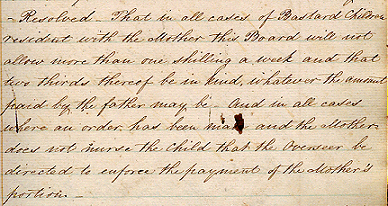
Care of the poor 4
Rhayader Poor Law Union
A harsh new regime
In 1834 the Poor Law Ammendment
Act was passed which required parishes to group together
into Poor Law Unions, each run by an elected Board
of Guardians. This was hoped to be a more cost-effective
way of providing care for the poor. Central to the new regime
was the workhouse which each Union was required to build
to house those paupers claiming assistance. Here they were locked
in and men separated from their wives and children.
The care was meant to be harsh and the new system hoped to make the stigma of going to the workhouse a deterrent in itself. In return for food, clothing, shelter and medical care the inmates were given strenuous work such as crushing stone, picking oakum or making flannel. They would not be released until they could support themselves in the outside community. For those too old or too ill to work this could mean spending their last years locked in the workhouse.
The Rhayader Union
In terms of the population it served the Rhayader Union was very
small. This may be one reason why the new Board of Guardians
took such a long time to build a workhouse, preferring to provide
outdoor relief instead. The care was strictly controlled by the
new Union as this 1836 extract from the Board of Guardians' minute
book shows.
County Archives
R/G/C/8/1/1

"Resolved - That in all cases of Bastard Children resident with the Mother this Board will not allow more than one shilling a week and that two thirds thereof be in kind, whatever the amount paid by the father may be. And in all cases where an order has been made and the Mother does not nurse the child that the Overseer be directed to enforce the payment of the Mother's portion."